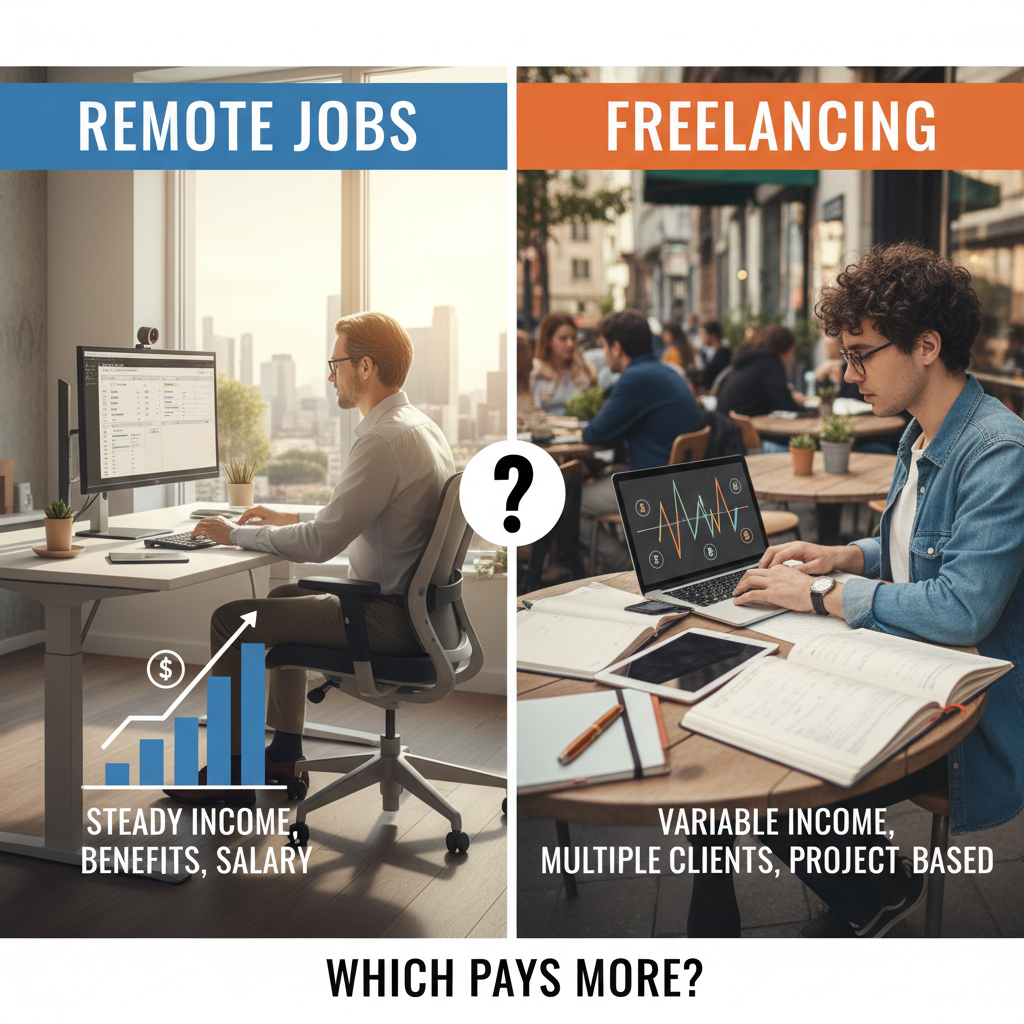Introduction
The debate between remote jobs vs freelancing has become one of the hottest career discussions in recent years. Both paths are appealing for professionals who want flexibility, independence, and a better work-life balance. However, when it comes to earnings, the comparison is not as simple as choosing one over the other. Salaries and income potential vary based on skill set, industry, experience, and even personal work habits.
Remote jobs have grown rapidly as companies embrace distributed teams. Meanwhile, freelancing has surged due to the gig economy, allowing professionals to work with clients worldwide. Each option comes with its own advantages and challenges. To understand which pays more, it’s essential to look at salary structures, long-term growth opportunities, and current market trends.
You can read the summary of this article here.
Understanding Remote Jobs: Stability with Steady Salaries
What Defines a Remote Job?
A remote job functions like a traditional role, except you don’t need to work in an office. Employers expect you to log in at specific hours, complete tasks, and collaborate virtually. The appeal lies in its predictability. You know how much you will earn each month, and in most cases, you also get benefits such as health insurance, retirement plans, and paid time off.
Salary Ranges for Remote Jobs
The income potential in remote jobs depends on the industry. In-demand roles in software engineering, cybersecurity, and digital marketing often come with competitive salaries that can match or exceed in-office roles. On the other hand, jobs like customer support or administrative assistance may offer lower pay but compensate with consistency.
Advantages of Remote Job Salaries
The biggest financial advantage of remote jobs is stability. Since paychecks arrive regularly, professionals can budget effectively and plan for future expenses. This is a significant advantage compared to freelancing, where income often fluctuates.
Freelancing: Independence and Higher Earning Potential
What Makes Freelancing Different?
Unlike remote jobs, freelancing gives you complete control. You choose projects, set rates, and decide how many clients to work with. Skilled freelancers in fields like content creation, design, or IT consulting often out-earn salaried employees.
Freelance Income Variations
A freelancer’s income can vary dramatically. Some may earn $1,500 in a slow month, while others make $10,000 or more if they manage multiple high-paying clients. The potential is huge, but so are the risks. Income depends on self-marketing, networking, and maintaining a steady flow of projects.
Benefits and Challenges of Freelance Pay
While freelancing offers freedom and high earning potential, it also lacks employer-provided benefits. Health insurance, taxes, and retirement savings fall entirely on the freelancer. This means the net income may be lower than expected if not managed properly.

Comparing Pay Structures: Fixed Salaries vs Project-Based Earnings
Predictability of Remote Salaries
In remote jobs vs freelancing, the difference is clear in income structure. Remote jobs provide fixed salaries, which guarantee financial stability. No matter how busy or slow the workday is, the paycheck remains the same.
Flexibility of Freelance Income
Freelancers, however, earn on a project or hourly basis. This flexibility allows them to earn more during peak seasons but also exposes them to financial droughts when projects are scarce. For instance, a freelance graphic designer might double the salary of a remote counterpart one month but struggle the next.
Accounting for Overhead Costs
Another difference lies in expenses. Freelancers often pay for their own tools, software subscriptions, and marketing, while remote employees usually receive these from their employers. Factoring in these costs is essential when comparing actual take-home pay.
Long-Term Financial Growth: Security vs Scalability
Career Growth in Remote Jobs
Remote jobs often come with structured career paths. Raises, promotions, and bonuses create steady financial growth over time. For professionals seeking stability and predictable long-term income, this model is highly attractive.
Freelancing as a Scalable Business
Freelancers, however, have unlimited scalability. By raising rates, taking on larger clients, or building a personal brand, freelancers can exponentially grow their income. Many freelancers eventually turn into agency owners, creating passive income streams by outsourcing work.
Which Has Better Long-Term Potential?
In terms of remote jobs versus freelancing, long-term freelancing may yield higher earnings if the freelancer develops strong skills and fosters solid client relationships. However, remote jobs remain better for professionals who prefer stability over entrepreneurial challenges.
Market Trends in 2025: Remote Jobs vs Freelancing
Growth of Remote Work
Remote jobs have become mainstream across industries. Companies now hire global talent and offer salaries that are competitive with those in in-office roles. Many professionals prefer remote jobs because of their stability and benefits.
Rise of the Freelance Economy
On the other hand, freelancing continues to boom. The global freelance market is projected to grow into trillions of dollars, with businesses outsourcing specialized skills. This creates enormous earning potential for skilled freelancers willing to adapt and market themselves effectively.
Which Option Looks More Profitable?
In 2025, freelancing appears more lucrative for top talent, while remote jobs remain the go-to choice for professionals who value consistent income. The decision depends on whether you prefer stability or the possibility of higher but fluctuating earnings.
Conclusion
So, in the debate of remote jobs vs freelancing, which pays more? The answer depends on the individual’s priorities. Remote jobs offer steady pay, structured growth, and benefits that provide financial peace of mind. Freelancing, while riskier, offers independence and the potential to earn significantly more, especially for those who build strong reputations and manage clients effectively.
Some professionals even blend the two models, maintaining a remote job while freelancing on the side to diversify income. The best path is the one that aligns with your lifestyle, financial goals, and risk appetite. Whether you choose stability or independence, both options can lead to fulfilling and financially rewarding careers if managed wisely.
Find Your Dream Job Today Explore Endless Career Opportunities and Secure Your Next Role with Best Job Tool.



